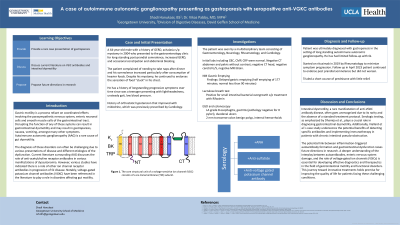Tuesday Poster Session
Category: Stomach
P4250 - A Case of Autoimmune Autonomic Ganglionopathy Presenting as Gastroparesis With Seropositive Anti-VGKC Antibodies
Tuesday, October 24, 2023
10:30 AM - 4:00 PM PT
Location: Exhibit Hall

Has Audio

Josephine Hanukaai, BS
Georgetown University School of Medicine
Washington, District of Columbia
Presenting Author(s)
Josephine Hanukaai, BS1, Vikas Pabby, MD, MPH2
1Georgetown University School of Medicine, Washington, DC; 2David Geffen School of Medicine, Los Angeles, CA
Introduction: Autoimmune autonomic ganglionopathy (AAG) is a rare cause of gut dysmotility. Diagnosis can often be challenging due to various presentations of disease and different etiologies of the dysfunction. The current literature surrounding AAG discusses the role of anti-acetylcholine receptor antibodies associated with dysautonomia. We report a rare case of AAG presenting as gastroparesis in the setting of anti-voltage-gated potassium channel antibodies (anti-VGKC) antibodies.
Case Description/Methods: A 64-year-old male presented to the gastroenterology clinic with long-standing postprandial somnolence, increased heartburn, and abdominal bloating. He had a long-standing history of orthostatic hypotension, unsteady gait and lightheadedness since adolescence. He had a history of gastroesophageal reflux disease (GERD) and achalasia status post surgical myotomy in 2004. The patient was evaluated by a multidisciplinary team consisting of Gastroenterology, Neurology, Rheumatology, and Cardiology. His extensive work up consisting of a CT abdomen and pelvis, CT head, carotid ultrasound, and brain MRI were all unremarkable. Upper and lower endoscopy showed Los Angeles grade B esophagitis, gastritis (pathology negative for H pylori), and duodenal ulcers. A lactulose breath test was positive for small intestinal bacterial overgrowth and gastric emptying study diagnosed gastroparesis. Serologic testing was positive for ANA, anti-sulfatide, and anti-voltage gated potassium channel antibodies, at which time the working diagnosis was gastroparesis in the setting of AAG. The patient was then started on rituximab in 2019, and his symptoms have not progressed further.
Discussion: The presence of anti-VGKC antibodies in disorders related to gut dysmotility are poorly documented. Our case demonstrates that intestinal dysmotility is a rare manifestation of anti-VGKC antibody disease and serologic testing can aid in the diagnosis of AAG. The mechanism of this association is poorly understood. VGKC are present on the membrane of neurons in the central and peripheral nervous system. Anti-neuronal antibodies are thought of as a paraneoplastic process arising against onconeural antigens expressed against a neoplasm. Additionally, these antibodies have been found in a small number of patients with gastrointestinal dysfunction secondary to Chagas’ disease. Increased awareness of AAG related to anti-VGKC antibodies may lead to improved diagnosis and disease outcomes.
Disclosures:
Josephine Hanukaai, BS1, Vikas Pabby, MD, MPH2. P4250 - A Case of Autoimmune Autonomic Ganglionopathy Presenting as Gastroparesis With Seropositive Anti-VGKC Antibodies, ACG 2023 Annual Scientific Meeting Abstracts. Vancouver, BC, Canada: American College of Gastroenterology.
1Georgetown University School of Medicine, Washington, DC; 2David Geffen School of Medicine, Los Angeles, CA
Introduction: Autoimmune autonomic ganglionopathy (AAG) is a rare cause of gut dysmotility. Diagnosis can often be challenging due to various presentations of disease and different etiologies of the dysfunction. The current literature surrounding AAG discusses the role of anti-acetylcholine receptor antibodies associated with dysautonomia. We report a rare case of AAG presenting as gastroparesis in the setting of anti-voltage-gated potassium channel antibodies (anti-VGKC) antibodies.
Case Description/Methods: A 64-year-old male presented to the gastroenterology clinic with long-standing postprandial somnolence, increased heartburn, and abdominal bloating. He had a long-standing history of orthostatic hypotension, unsteady gait and lightheadedness since adolescence. He had a history of gastroesophageal reflux disease (GERD) and achalasia status post surgical myotomy in 2004. The patient was evaluated by a multidisciplinary team consisting of Gastroenterology, Neurology, Rheumatology, and Cardiology. His extensive work up consisting of a CT abdomen and pelvis, CT head, carotid ultrasound, and brain MRI were all unremarkable. Upper and lower endoscopy showed Los Angeles grade B esophagitis, gastritis (pathology negative for H pylori), and duodenal ulcers. A lactulose breath test was positive for small intestinal bacterial overgrowth and gastric emptying study diagnosed gastroparesis. Serologic testing was positive for ANA, anti-sulfatide, and anti-voltage gated potassium channel antibodies, at which time the working diagnosis was gastroparesis in the setting of AAG. The patient was then started on rituximab in 2019, and his symptoms have not progressed further.
Discussion: The presence of anti-VGKC antibodies in disorders related to gut dysmotility are poorly documented. Our case demonstrates that intestinal dysmotility is a rare manifestation of anti-VGKC antibody disease and serologic testing can aid in the diagnosis of AAG. The mechanism of this association is poorly understood. VGKC are present on the membrane of neurons in the central and peripheral nervous system. Anti-neuronal antibodies are thought of as a paraneoplastic process arising against onconeural antigens expressed against a neoplasm. Additionally, these antibodies have been found in a small number of patients with gastrointestinal dysfunction secondary to Chagas’ disease. Increased awareness of AAG related to anti-VGKC antibodies may lead to improved diagnosis and disease outcomes.
Disclosures:
Josephine Hanukaai indicated no relevant financial relationships.
Vikas Pabby indicated no relevant financial relationships.
Josephine Hanukaai, BS1, Vikas Pabby, MD, MPH2. P4250 - A Case of Autoimmune Autonomic Ganglionopathy Presenting as Gastroparesis With Seropositive Anti-VGKC Antibodies, ACG 2023 Annual Scientific Meeting Abstracts. Vancouver, BC, Canada: American College of Gastroenterology.
